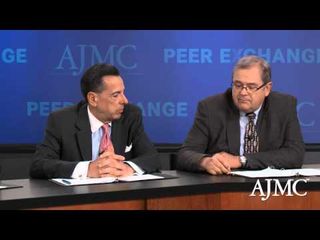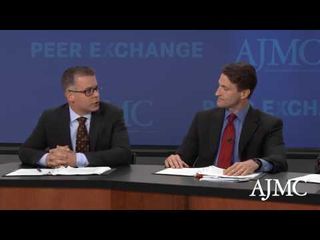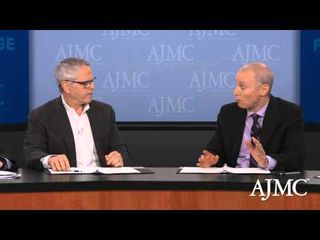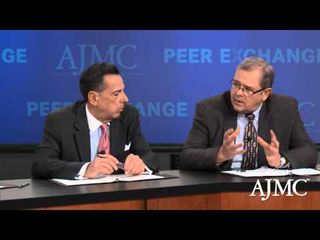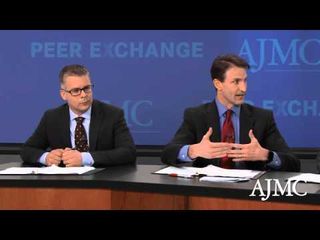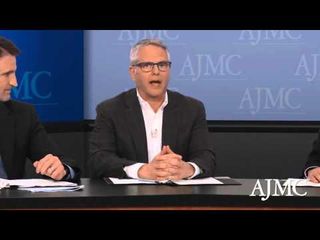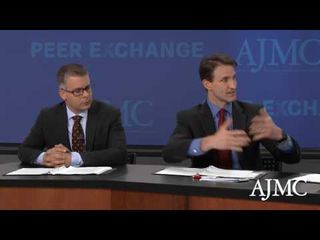
Policy
Latest News

Blockage of proposed bill that would protect in vitro fertilization (IVF) reignites debate over reproductive rights and health care access; ransomware attack leaves patients and providers stranded; people 65 years and older should get an additional booster for the COVID-19 vaccine, CDC says.

What We’re Reading: Alabama IVF Ruling; UnitedHealth Antitrust Probe; Food as Medicine Initiative
Latest Videos

CME Content
More News

Fabiola Molina, MD, MHS, is a practicing hospitalist and assistant professor of medicine at Yale School of Medicine and Yale New Haven Hospital. An immigrant from Mexico, her experiences straddling 2 worlds, while attempting to navigate with her family the complicated safety-net system for health care in Texas, were key influences to her ardent focus on health equity.

In this final part of our interview with James Robinson, PhD, MPH, he underscores the need for employer education about the health plans they offer, fostering managed competition among hospital systems to drive down costs, and innovation in financing drug development.

Patients with cancer express shock and anxiety over the recent ruling by the Alabama Supreme Court regarding frozen embryos; doctors are beginning to charge fees for administrative tasks; some universities are implementing accelerated nursing programs to help with the shortage.

The House Democratic Women’s Caucus wrote a letter urging insurers to comply with both contraceptive coverage requirements and recent Biden administration guidance; several pharmacy chains are experiencing disruptions following a hack at Change Healthcare, UnitedHealth’s technology unit; the FDA said it is not planning to take a tougher stance against clinical trial reporting requirement noncompliance.

In part 3 of our interview with James Robinson, PhD, MPH, he discusses the need for reforms to commercial insurance that reflect the changes to Medicare under the Inflation Reduction Act, how the 340B drug pricing program has veered widely from its original goals, and ongoing cost sharing struggles among patients, insurers, hospitals, and drug companies.

Shauna Downs, PhD, MS, is an associate professor in the Department of Health Behavior, Society, and Policy at the Rutgers School of Public Health. A former figure skater, her research now focuses on interventions to promote healthy and sustainable food choices and exploring how our changing climate, food systems, diet, and nutrition are inextricably linked.

More than half of US adults have a favorable view of the Affordable Care Act (ACA); smartwatches and rings that claim to measure blood sugar levels without piercing the skin could be dangerous and should be avoided; many believe artificial intelligence (AI) could be the solution to physician burnout.

In part 2 of our interview with Robinson, he addresses the potential for exacerbated health care disparities in the aftermath of hospital price markups and how insurance plan design often disadvantages the patients who most need expensive infusion therapies but cannot afford them.

What We’re Reading: Weight Loss Drug Coverage; COVID Vaccine Potential AEs; Shifting Medicaid Policy
Insurers grapple with expanding overage for weight loss medications; a new analysis reveals a potential correlation between COVID-19 vaccinations and various adverse effects (AEs); reshaping Medicaid programs remains an ongoing debate about ensuring health care access.

Carrie Kozlowski, OT, MBA highlights 3 key trends shaping the future of health care: a focus on health equity with actionable strategies for equitable access to care, a transition toward responsible AI utilization, and a push to maximize the potential of patient data while addressing privacy concerns.

Discontinuation of asthma drug leaves patients in search of alternative; FDA’s approach to artificial intelligence (AI) raises opportunities and challenges; landmark FDA approval signals hope for millions with severe food allergies.

This week in health equity and access includes challenges for independent physicians due to Medicare cuts, inequities in access to State Health Insurance Assistance Program counseling, a study on patient experiences in national health plans, strategies for building trust in cancer care, and increasing breast cancer rates in young Black women.

In the January issue of The New England Journal of Medicine, James Robinson, PhD, MPH, and his fellow investigators published their findings from an analysis of how insurer drug expenditures on infused drugs influenced price markups at hospitals.

Medicare beneficiaries are beginning to see the first savings from the Inflation Reduction Act; abortion pills prescribed to patients via telehealth and the mail are safe; nearly half of health care workers have witnessed racism or discrimination in their workplace.

Part of the recent Medicare reimbursement cuts could be addressed in a spending package next month; Medicaid/Medicare dual eligibles are expected to generate big profits for health insurers; FDA sent warning letters to online vendors selling unapproved and misbranded versions of semaglutide and tirzepatide.

Coverage from "Navigating the PBM Landscape: How a Heath Care Economist Sees It," at Patient-Centered Oncology Care 2023.

"I'll say what I don't think the issue is—it's not technology. We can solve this problem with technology," Carrie Kozlowski, OT, MBA, explains in the interview.

What We’re Reading: Medicare Lawsuit Dismissed; COVID Isolation Guidelines; Millions Have Long COVID
A ruling against Pharmaceutical Research and Manufacturers of America marks victory for efforts to lower health care costs; new guidelines align with flu and respiratory syncytial virus protocols; children and pregnant individuals are burdened with long-term health symptoms in the aftermath of COVID-19.

The federal State Health Insurance Assistance Program (SHIP) provides counseling and education on Medicare coverage options. This article highlights potential inequities in in-person SHIP service access.

Over the past 20 years, Medicare physician pay has plummeted by 26% when adjusted for inflation, while hospital reimbursement has surged by 70%, prompting over 100,000 doctors to abandon independent practice for hospital or corporate employment since 2019.

A wave of drug supply chain problems would occur if the FDA pulled cough and cold medications containing the active ingredient phenylephrine from shelves; lawmakers in 19 states are considering bills allowing medically assisted death; tuberculosis awareness is lagging as state and local health departments lack the resources to keep up with prevention and control efforts.

A provision in the Inflation Reduction Act will implement a $2000 out-of-pocket cap on Medicare beneficiaries’ prescription drug spending, which could save money for more than 1 million enrollees when it takes effect next year.

Miriam J. Atkins, MD, FACP, president of the Community Oncology Alliance, discusses the impact of pharmacy benefit managers (PBMs) on health care costs and offers potential ways to remedy certain CMS decisions that negatively affect oncologists and their patients.

Amazon and Health Warehouse’s direct-to-consumer pharmacies had the most expensive and commonly used generic drugs available in 2020, whereas Walmart only had a small fraction.

States channel billions into housing for the homeless using Medicaid funds; AstraZeneca invests $300 million to discover and develop cell therapies; the CDC highlights dangers of menthol cigarette addiction.


